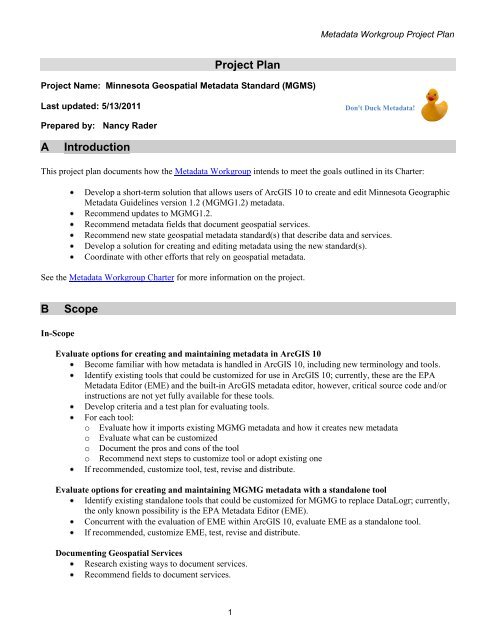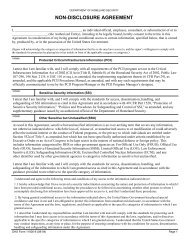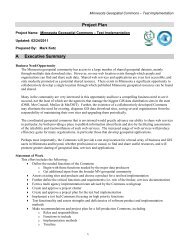Project Management Plan Example - MnGeo
Project Management Plan Example - MnGeo
Project Management Plan Example - MnGeo
Create successful ePaper yourself
Turn your PDF publications into a flip-book with our unique Google optimized e-Paper software.
Metadata Workgroup <strong>Project</strong> <strong>Plan</strong><br />
<strong>Project</strong> <strong>Plan</strong><br />
<strong>Project</strong> Name: Minnesota Geospatial Metadata Standard (MGMS)<br />
Last updated: 5/13/2011<br />
Don't Duck Metadata!<br />
Prepared by: Nancy Rader<br />
A<br />
Introduction<br />
This project plan documents how the Metadata Workgroup intends to meet the goals outlined in its Charter:<br />
Develop a short-term solution that allows users of ArcGIS 10 to create and edit Minnesota Geographic<br />
Metadata Guidelines version 1.2 (MGMG1.2) metadata.<br />
Recommend updates to MGMG1.2.<br />
Recommend metadata fields that document geospatial services.<br />
Recommend new state geospatial metadata standard(s) that describe data and services.<br />
Develop a solution for creating and editing metadata using the new standard(s).<br />
Coordinate with other efforts that rely on geospatial metadata.<br />
See the Metadata Workgroup Charter for more information on the project.<br />
B<br />
Scope<br />
In-Scope<br />
Evaluate options for creating and maintaining metadata in ArcGIS 10<br />
Become familiar with how metadata is handled in ArcGIS 10, including new terminology and tools.<br />
Identify existing tools that could be customized for use in ArcGIS 10; currently, these are the EPA<br />
Metadata Editor (EME) and the built-in ArcGIS metadata editor, however, critical source code and/or<br />
instructions are not yet fully available for these tools.<br />
Develop criteria and a test plan for evaluating tools.<br />
For each tool:<br />
o Evaluate how it imports existing MGMG metadata and how it creates new metadata<br />
o Evaluate what can be customized<br />
o Document the pros and cons of the tool<br />
o Recommend next steps to customize tool or adopt existing one<br />
If recommended, customize tool, test, revise and distribute.<br />
Evaluate options for creating and maintaining MGMG metadata with a standalone tool<br />
Identify existing standalone tools that could be customized for MGMG to replace DataLogr; currently,<br />
the only known possibility is the EPA Metadata Editor (EME).<br />
Concurrent with the evaluation of EME within ArcGIS 10, evaluate EME as a standalone tool.<br />
If recommended, customize EME, test, revise and distribute.<br />
Documenting Geospatial Services<br />
Research existing ways to document services.<br />
Recommend fields to document services.<br />
1
Metadata Workgroup <strong>Project</strong> <strong>Plan</strong><br />
Recommend Metadata Standard(s) for Approval as a State Standard<br />
Identify the pros and cons of MGMG1.2 versus NAP.<br />
Develop a crosswalk between MGMG1.2 and NAP.<br />
Develop a recommendation for a dataset and a services content standard, including whether or not they<br />
are separate standards.<br />
Propose the metadata standard(s) to the <strong>MnGeo</strong> Standards Committee.<br />
During this process, coordinate with the Geospatial Commons Workgroup and the Minnesota<br />
OpenData effort as needed.<br />
Out-of-Scope<br />
Developing new or revised training materials and educational resources, although very important for the adoption<br />
of standards, is beyond the scope of the workgroup’s present efforts. The workgroup will recommend next steps<br />
for developing or revising training and educational materials for Minnesota’s geospatial metadata standard(s).<br />
Scope <strong>Management</strong> <strong>Plan</strong><br />
Proposed scope changes will be assessed in terms of impact to project schedule, cost and resource usage. Any<br />
changes to this scope must be documented in a revised version of the project plan. Approval of <strong>Project</strong> Manager is<br />
required. Any scope changes involving staffing or funding changes also require the approval of the project owners.<br />
C<br />
Budget<br />
There is no budget for this project. All staff time, hardware, software and other resources will be contributed inkind<br />
from participating organizations.<br />
D<br />
<strong>Project</strong> Team<br />
The following people and organizations are stakeholders in this project and are included in the project planning.<br />
Additional project team members will be added as needed.<br />
Executive Sponsor: Commit resources and advocate for project<br />
David Arbeit, Minnesota CGIO, <strong>MnGeo</strong><br />
<strong>Project</strong> Owners: Ensure adequate resources are available and track project status<br />
Chris Cialek, <strong>MnGeo</strong><br />
Mark Kotz, Metropolitan Council<br />
<strong>Project</strong> Manager: Lead the planning and execution of the project, chair workgroup<br />
Nancy Rader, <strong>MnGeo</strong><br />
<strong>Project</strong> Workgroup: <strong>Plan</strong> and execute the project<br />
Chris Cialek, <strong>MnGeo</strong><br />
David Fawcett, Minnesota Pollution Control Agency<br />
Jim Gonsoski, Minnesota Department of Agriculture<br />
Jon Hoekenga, Metropolitan Council<br />
Mark Kotz, Metropolitan Council<br />
Susanne Maeder, <strong>MnGeo</strong><br />
Jesse Pearson, Minnesota Department of Transportation<br />
Eileen Quam, Office of Enterprise Technology<br />
Hal Watson, Minnesota Department of Natural Resources<br />
2
Metadata Workgroup <strong>Project</strong> <strong>Plan</strong><br />
Tool Evaluation Team: Evaluate metadata tools for ArcGIS 10 and standalone<br />
Jim Gonsoski, MN Dept. of Ag (Team Lead)<br />
Jon Hoekenga, Metropolitan Council<br />
Susanne Maeder, <strong>MnGeo</strong><br />
Jesse Pearson, Mn/DOT<br />
Hal Watson, MnDNR<br />
Services Team: Recommend method to document geospatial services<br />
Hal Watson, MnDNR (Team Lead)<br />
David Fawcett, PCA<br />
Mark Kotz, Met. Council<br />
Jesse Pearson, Mn/DOT<br />
Standards Team: Evaluate MGMG1.2 and NAP and recommend revised MGMG<br />
Mark Kotz, Met. Council (Team Lead)<br />
Chris Cialek, <strong>MnGeo</strong><br />
Susanne Maeder, <strong>MnGeo</strong><br />
Nancy Rader, <strong>MnGeo</strong><br />
<strong>Project</strong> Team <strong>Management</strong><br />
The project manager coordinates the project tasks assigned to team members. Changes to the project team require<br />
approval of the <strong>Project</strong> Manager and <strong>Project</strong> Owner for the affected agency if relevant. Changes will be tracked in<br />
revisions to the project plan.<br />
E<br />
<strong>Project</strong> Schedule<br />
Schedule <strong>Management</strong><br />
The project schedule will be updated as tasks are completed and posted online. Any changes must be documented<br />
in a revised project schedule. Approval of <strong>Project</strong> Manager is required.<br />
3
Metadata Workgroup <strong>Project</strong> <strong>Plan</strong><br />
Task<br />
Estimated Completion Done<br />
Date<br />
Approve project charter; post it online 5/4/11 <br />
Create teams and draft tasks 5/5/11 <br />
Draft project plan and send to workgroup for review 5/6/11 <br />
Finalize project plan; post online (will update the plan as the project progresses) 5/13/11<br />
Document why the workgroup chose to customize the EPA Metadata Editor (EME) for<br />
MGMG1.2 instead of other considered alternatives<br />
5/27/11<br />
Tool Evaluation Team<br />
Assess which EME features need to be customized for MGMG1.2 5/5/11 <br />
Get source code for latest version of EME (the project tasks for this team can be done without<br />
the source code; however, fewer features can be customized)<br />
when source code is<br />
released<br />
Customize Help; Remove EPA references from Help file, add any MGMG1.2 specific ones 5/20/11<br />
Customize metabase of default values; Remove EPA references; add MGMG1.2 specific ones 5/20/11<br />
Approve help and metabase changes with working group 5/27/11<br />
Customize interface; remove unneeded fields; add MGMG1.2 specific ones<br />
Source code dependent<br />
Repackage customized code as MGMG1.2 Editor<br />
Source code dependent<br />
Test both ArcGIS10 and stand-alone .NET versions 6/5/11<br />
Decide to include or remove stylesheet validation 6/12/11<br />
Distribute 6/15/11<br />
Services Team<br />
Research fields used to document services (NAP, GeoServices Finder, other…) 5/25/11<br />
Develop preliminary list of recommended fields 6/14/11<br />
Distribute for comment 6/15/11<br />
Recommend final list of recommended fields 7/1/11<br />
In coordination with the Standards Team, recommend whether or not services metadata<br />
7/15/11<br />
should be a separate standard or included within the dataset metadata standard<br />
Standards Team<br />
Compile initial list of user-suggested changes to MGMG1.2 4/25/11 <br />
Compile initial list of pros and cons of revising MGMG1.2 vs. migrating to NAP 4/25/11 <br />
Obtain current versions of NAP and of crosswalk between FGDC and NAP 5/20/11<br />
Review NAP 6/1/11<br />
Draft crosswalk from MGMG1.2 to NAP 6/1/11<br />
In coordination with the Services Metadata team, develop a recommendation for a dataset<br />
7/1/11<br />
content standard (e.g., revise existing MGMG, adopt full NAP, define a subset of NAP) with<br />
specific elements to be included<br />
In coordination with the Services Metadata team, recommend whether or not services<br />
7/15/11<br />
metadata should be a separate standard or included within the dataset metadata standard<br />
Create an XML template for the proposed standard(s) 8/17/11<br />
Send recommendation to workgroup and other key people for their review 8/17/11<br />
Revise proposed standard and prepare to submit to Standards Committee 9/12/11<br />
Present proposal to Standards Committee for public review 9/30/11<br />
Develop recommendations for additional training and educational materials (actual<br />
development of training and materials is beyond the scope of this project)<br />
Give presentation about the Metadata Workgroup efforts at the MN GIS/LIS Consortium<br />
Conference<br />
During public review<br />
period<br />
10/6/11<br />
4
Metadata Workgroup <strong>Project</strong> <strong>Plan</strong><br />
F<br />
Communication <strong>Plan</strong><br />
The Metadata Workgroup will meet regularly, as needed. Individual task teams will work closely on a weekly or<br />
daily basis while completing specific tasks.<br />
The workgroup maintains a Google Docs website for collaborative work; this site is accessible only to authorized<br />
users. Additional or alternate workgroup collaborative work sites will be considered if the need arises.<br />
All workgroup members, team members, project owners and others who have expressed interest are included in the<br />
email list for meeting agendas and meeting notes, which are also posted on the workgroup’s webpage. The project<br />
schedule will be updated periodically and posted on the workgroup webpage.<br />
Key stakeholder organizations, listed in the Workgroup Charter, will be kept abreast of the progress of the<br />
workgroup through their representatives on the workgroup.<br />
The workgroup chair/project manager will report progress to the following groups at their request:<br />
Statewide Geospatial Advisory Council<br />
State Government Geospatial Advisory Council<br />
The project will be presented at the Minnesota GIS/LIS Conference in October 2011. Workgroup members may<br />
also provide presentations about the project at other venues. Consortium e-announcements and newsletter articles<br />
will be submitted as needed to keep the Minnesota geospatial community informed.<br />
G<br />
Issues <strong>Management</strong><br />
As issues arise within the project, each team will determine if the issue is significant enough to report it to the<br />
<strong>Project</strong> Manager. The <strong>Project</strong> Manager, in consultation with the Team Lead, will decide if the issue should be<br />
reported to the full Workgroup. If so, the collaborative work site will be used as a place to describe and track<br />
issues. For project work to continue efficiently, it is desirable that most issues be resolved within each team or with<br />
consultation with the <strong>Project</strong> Manager. Issues may include testing results, unexpected problems, and other items<br />
that impact project completion.<br />
H<br />
<strong>Project</strong> <strong>Plan</strong> Documents Summary<br />
All significant electronic project documentation will be posted on the collaborative work site and, as appropriate,<br />
on its public webpage. Teams will determine when a document is sufficiently complete to post.<br />
5
















